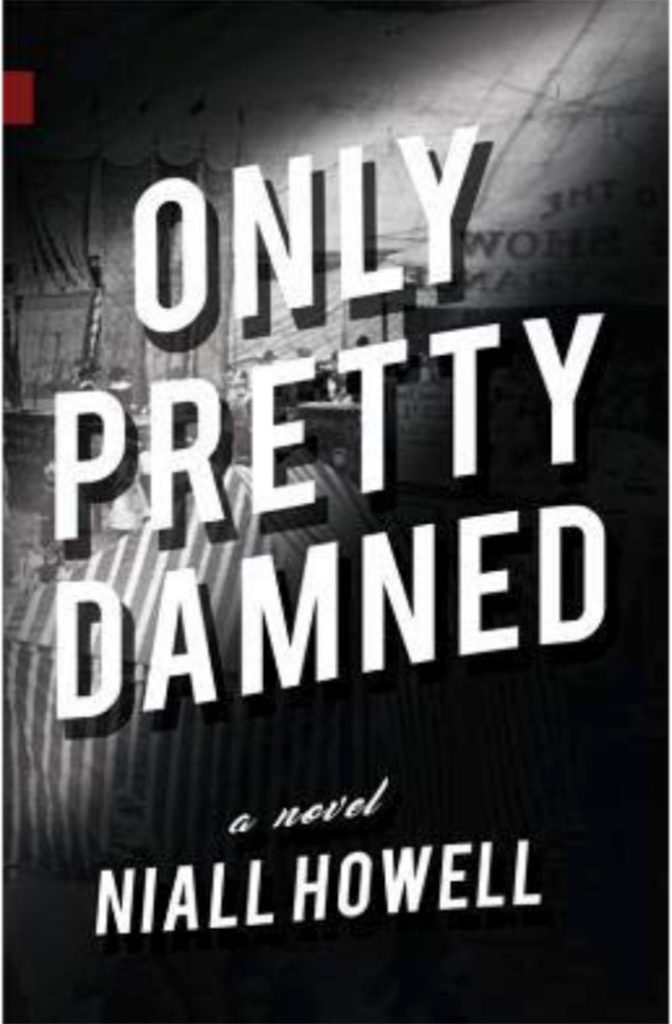 by Mike Thorn
by Mike Thorn
Only Pretty Damned
by Niall Howell
NeWest Press (2019)
ISBN 978-1-988732-53-4
Niall Howell’s Only Pretty Damned is a seriously impressive debut, showcasing a sophisticated sense of craft and a deep understanding of its genre’s genealogy. Centered on a traveling circus making its way through the unforgiving environs of post-WWII America and Canada, Damned is steeped in richly detailed sociohistorical texture. It is an intensely sensory book, sticky with sweat and booze and blood, and it is unapologetically cinematic, recalling everything from Tod Browning’s silent films to the American noir output of its depicted era—the antihero, Toby, recalls Lon Chaney’s dejected carnie characters from The Unknown (1927) and He Who Gets Slapped (1924) as readily as he recalls the haunted protagonists of postwar American film noir.
A former trapeze artist forced begrudgingly into clowning, Toby has a lust for success and recognition that is reignited by his budding relationship with Gloria, a woman who dances in his circus (Howell’s clever variation on the femme fatale archetype). The two characters’ interactions intensify and deepen as the novel progresses, shifting from gruff mutual affection into the inevitably more devious territory of murder and deception.
In addition to its filmic reference points, Only Pretty Damned situates itself consciously and deliberately in a rich literary tradition. Howell draws on the uncanny cadences and attitudes of James M. Cain, Donald Westlake and Jim Thompson while also building on the reflexive qualities of more contemporary genre writers like James Ellroy and Stephen King. The novel is packed with gleefully vicious wordplay, demonstrating its author’s fastidious attention to rhythm, vernacular and attitude.
I cannot overstate how well Howell understands the fundamental importance of style, lending as much focus to his language’s musicality as he does to his meticulous plotting. Indeed, in Damned language serves as a complex and powerful means of exploring voice and psychology. As in Jim Thompson’s greatest and most pessimistic novels (The Killer Inside Me, Heed the Thunder, The Getaway) this book’s narrative emerges from its characters’ subordination to their darkest impulses. Like Thompson, famously nicknamed “dime-store Dostoevsky,” Howell commits time and space to his protagonist’s milieu and unadulterated perspective before fully wading into plot machinations. By offering such solid character-based foundation, the novel amplifies the anxiety that results from its eventual descent into crime and consequence.
Perhaps what is most remarkable about Only Pretty Damned is its uniqueness. While Howell clearly respects and understands his antecedents, his book emerges fully formed as its own entity. It is characterized by a fresh, distinctly acerbic sense of humour, amplified by the lyrical bluntness of its first-person narration. It also exhibits genuine empathy and affection for its characters, committing to nuanced psychological representation even amid its bleak, brutal proceedings. This is an immersive reading experience, driven by masterfully pitched narrative momentum and tension. More than anything, though, I savoured this book for the language. Only Pretty Damned announces the arrival of a formidable new talent in Canadian literature.
Mike Thorn is the author of the short story collection Darkest Hours. His fiction has appeared in numerous magazines, anthologies, and podcasts, including Dark Moon Digest, The NoSleep Podcast, Tales to Terrify, and Straylight Literary Arts Magazine. His criticism has been published recently in MUBI Notebook, The Film Stage, The Seventh Row, and Vague Visages. He completed his M.A. with a major in English literature at the University of Calgary. For more information, visit mikethornwrites.com.


No Comments